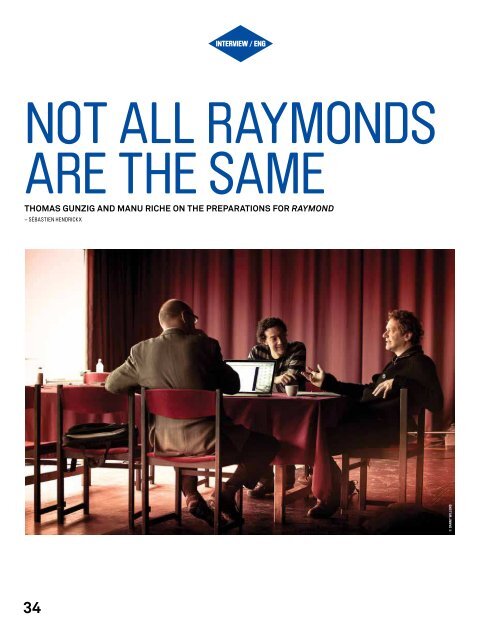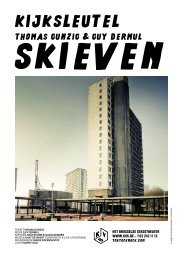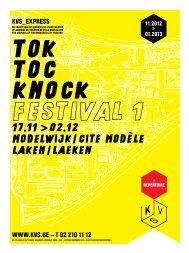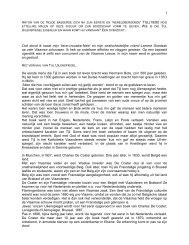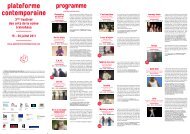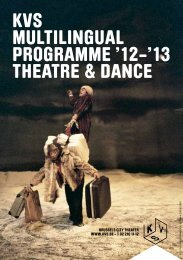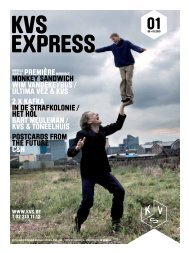februari-juni - KVS
februari-juni - KVS
februari-juni - KVS
You also want an ePaper? Increase the reach of your titles
YUMPU automatically turns print PDFs into web optimized ePapers that Google loves.
34<br />
interview / eng<br />
Not ALL RAyMoNdS<br />
ARE tHE SAME<br />
ThoMas GUnZiG anD ManU Riche on The PRePaRaTions FoR Raymond<br />
– SéBAStIEN HENdRICKX<br />
© Danny Willems<br />
It was the documentary filmmaker Manu Riche who<br />
had the idea of doing something on the subject of the<br />
legendary football trainer Raymond Goethals (1921-<br />
2004). Raymond was originally a film project. ‘I had a<br />
sort of Belgian-style biopic in mind,’ says Riche. ‘Not<br />
a grand mythological story as in Hollywood, but a<br />
quest for the little idiosyncrasies of this exceptional<br />
man.’ Raymond ultimately took the form of a stage<br />
monologue written by Thomas Gunzig rather than a<br />
film. French-speaking Belgium has already known<br />
him for several years as a writer, columnist and frequent<br />
guest on radio and television programmes.<br />
Since he moved from Le Soir to De Standaard as the<br />
permanent home for his columns, he has been well<br />
on the way to becoming a familiar public voice in<br />
Flanders too. We spoke to Manu Riche and Thomas<br />
Gunzig on the basis of the provisional script for the<br />
Raymond monologue.<br />
Manu, what attracted you to<br />
Raymond Goethals?<br />
M: Like many people from Limburg, in the area<br />
where I grew up, I was always a big fan of the Standard<br />
football club. I was 18 in 1982, when, under<br />
Goethals, the team once again became the Belgian<br />
champions. It came as a tremendous shock when,<br />
two years later, it turned out that the decisive match,<br />
against Waterschei, actually the neighbouring borough<br />
to where I lived, had been fixed. After that<br />
Goethals was banned from ever again being a trainer<br />
in Belgian football. He moved to Bordeaux and Marseille,<br />
where he achieved his greatest successes.<br />
That victory, the corruption affair and the ban that<br />
followed all came to occupy an important place in<br />
my personal mythology. And also, Goethals was a<br />
living legend on both sides of the language border.<br />
He merrily mixed French and Dutch together in his<br />
vivid Brussels dialect. He is the symbol of the Belgium<br />
I grew up in and which is now about to disappear,<br />
or in fact already has disappeared as a result<br />
of successive state reforms.<br />
Your documentaries are often portraits of<br />
people in leadership positions, such as the<br />
boss of antwerp’s harbour, Fernand huts,<br />
and the socialist leader steve stevaert. Do<br />
individuals underlie historical developments<br />
or are they rather the products of them?<br />
M: My films are not so much psychological character<br />
sketches as sociological portraits. What is the<br />
context in which a particular individual functions<br />
and what dialogue does he enter into with that context?<br />
In the past I have in this way looked into the<br />
worlds of politics, economics and music, and now of<br />
sport too. No, I don’t think individuals can really turn<br />
events in a particular direction, it is more that they<br />
are themselves directed. That also applies to the<br />
leaders in my films. They often cherish the illusion<br />
that they have control over things, and that it is they<br />
who will decide. There’s something tragic about this<br />
that particularly fascinates me. When you start from<br />
the angle of the person in power, you get a much better<br />
view of the ambivalent mechanism of power than<br />
if you started out from the person in a subordinate<br />
position or, even more so, the victim. In those cases<br />
you see above all injustice and suffering, the effects<br />
of power.<br />
Thomas, in the monologue you are writing,<br />
are you distancing yourself a little from<br />
Manu’s original documentary intentions? Your<br />
fictional character, Raymond, is only loosely<br />
based on Goethals’ life. how did that choice<br />
come about?<br />
T: Limitations can be extremely stimulating for a<br />
writer. That’s why I like working on commission, so<br />
as to do something on a specific subject that has<br />
been presented to me. When I received a telephone<br />
call from the <strong>KVS</strong> this summer, asking me whether I<br />
would write a monologue about Raymond Goethals, I<br />
immediately made it clear that I liked sport, but that<br />
football didn’t particularly appeal to me. I don’t actually<br />
know much about it. I felt the only way I could<br />
react to the request was to distance myself from the<br />
‘real’ Goethals and invent something completely new.<br />
What were your starting points<br />
for writing the play?<br />
T: I was keen to start from a turning point, looking<br />
for what underlay the myth. Not that of Goethals,<br />
but of ‘my’ Raymond. What made him throw himself<br />
into life with such energy and become so obsessed<br />
with a specific issue? After all, we are not born as<br />
the people we turn out to be. There is a whole series<br />
of external factors – sociological, historical, personal,<br />
etc. – that shape us as subjects.<br />
Your monologue is put together in an unusual<br />
way. Why did you opt to tell the story of your<br />
character’s development in a non-linear way?<br />
T: I see texts as objects, which a writer can<br />
charge with energy by means of specific interventions.<br />
In Raymond, a number of elements are introduced<br />
in the beginning and are regularly returned<br />
to. As the script progresses, I enrich these elements<br />
with new information. Something which I might have<br />
started subtly at the beginning may later be emphasised<br />
and at the end perhaps be put in a completely<br />
different light. Instead of composing my script in a<br />
linear manner, with the causes coming neatly before<br />
the effects, I opted for a more complex construction,<br />
though in spite of this it is not difficult to understand.<br />
After all, we think and talk like this in our daily lives.<br />
We say something and then come back to it later. By<br />
reformulating something we often see more clearly<br />
what we had previously been trying to say.<br />
Will the ‘real’ Raymond still have a part to play<br />
in the piece as it ultimately turns out?<br />
T: My character does of course still have a number<br />
of characteristics in common with Raymond<br />
Goethals. And it is up to Manu and Josse De Pauw to<br />
put my script to their own use, with complete freedom.<br />
A play is not a fully rounded piece of writing. It<br />
is written to put on stage, to be brought to life by a<br />
director, an actor, a stage designer, etc.<br />
M: I am thinking of reintroducing Goethals into<br />
the play using film. Not so much in images as in<br />
sound. I will probably make a montage of the sound<br />
material I found in the archives. It would be nice to<br />
introduce Goethals’ presence in the form of a sound<br />
piece that ‘encircles’ Thomas’ words.<br />
ThoMas GUnZiG<br />
Thomas Gunzig (1970) is currently one of the most<br />
widely-read and versatile French-language writers<br />
in Belgium. In addition to novels, he has also<br />
had short stories, children’s books, radio plays and<br />
stage plays published. His literary work has received<br />
several awards and has been translated into many<br />
languages (though not yet into Dutch, unfortunately).<br />
He also lectures in literature at several colleges and<br />
is also well-known as a chronicler and as a guest on<br />
radio and TV programmes on the Belgian Frenchlanguage<br />
RTBF. Recently he started writing columns<br />
for De Standaard. His work is characterised by great<br />
imagination and black humour.<br />
ManU Riche<br />
The documentary-maker Manu Riche (1964) was one<br />
of the first people to work on the RTBF cinéma vérité<br />
magazine Strip-Tease. In the 90s he produced several<br />
independent documentaries in coproduction<br />
with European public broadcasters. In early 2000 he<br />
examined the relationship between fiction and reality<br />
in two films on Belgian icons: King Baudouin and<br />
Georges Simenon. Riche conceived, produced and<br />
directed the series of documentaries entitled Hoge<br />
Bomen (VRT & RTBF), which were exceptional portraits<br />
of people in power. He is currently putting the<br />
finishing touches to his latest documentary, Snake<br />
dance, and is engaged in the pre-production stages<br />
of the fiction film Problemski Hotel.<br />
raYmonD<br />
p. 06<br />
35


